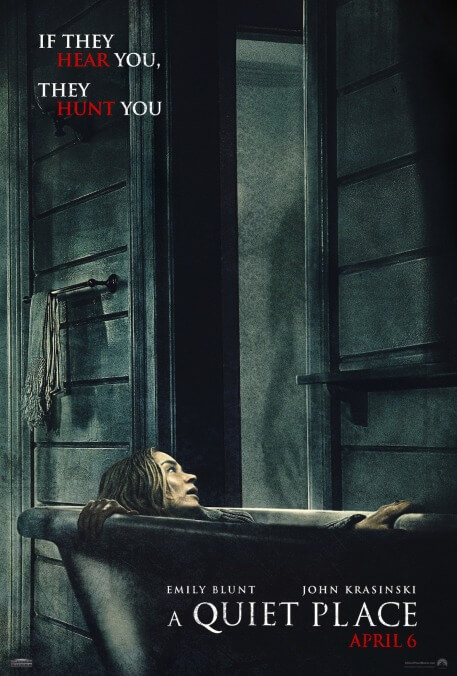For a while, A Quiet Place mostly just lays out the zip-lipped, post-apocalyptic lives of the Abbott family, moving like petrified ninjas across the abandoned streets of civilization. (“It’s sound!” reads a quickly glimpsed headline—surely the newspaper’s last, given that running the printing press probably got the whole staff eaten.) In a farmhouse with painted paths around its squeakiest floorboards, Lee (a bearded Krasinki), Evelyn (Emily Blunt), and their two children, Regan (Millicent Simmonds) and Marcus (Noah Jupe), continue the longest round of the quiet game ever played, never speaking above a whisper, almost literally walking on eggshells. One reason they’ve survived longer than their neighbors is that Regan is deaf, meaning that the Abbotts already knew sign language before the extraterrestrials showed up. But they’ve also learned from their fatal mistakes—the screw-up that cost these grieving parents their youngest child, and which provides the movie some stakes beyond the matter of evading otherworldly mantises on the prowl.
At just 90 minutes, A Quiet Place is brisk, but it’s also patient; this is one of those monster movies that builds tension from the absence of the monster, at least until the full-bore, unbroken set-piece of the second half, when all the stillness and pregnant pauses give way to an extended riff on the best scenes in Jurassic Park. (The creatures move with the swift intelligence of Spielberg’s raptors, but can be fooled the same way the mighty T. rex can: by standing still and not making a peep.) Fittingly, for a film about the danger of sudden spikes in volume, the sound design is sophisticated. Krasinski immediately establishes Regan’s impairment by dimming the room tone to total silence during her close-ups. He also uses Marco Beltrami’s tense score very sparingly—the better to draw us into the characters’ cone of terror, attuning us to the small noises that might give away their position and the loud, offscreen ones that announce that an unwanted visitor is afoot.
Genre becomes a kind of backdoor to innovation, the excuse to make a Hollywood movie so low on dialogue. (Would audiences even accept a thriller this muted if it didn’t also feature some noisy scares to offset the feature-length lull?) A Quiet Place is a change of pace for Krasinski the director, whose previous films—the David Foster Wallace adaptation Brief Interviews With Hideous Men, the indie dramedy The Hollars—were decidedly lacking in sightless CGI monsters. But it’s right in the wheelhouse of Krasinski the actor, who spent nine sitcom seasons transmitting his emotions through facial expressions. It’s a challenge to which the whole cast rises. Turns out Evelyn is pregnant (the movie tastefully denies us what would have been the quietest sex scene ever), and ends up going into labor at a very inopportune time—a diabolical twist that allows Blunt to perform a superb pantomime of suppressed pain and fear, realizing a Scientologist’s insane ideal for childbirth. And Simmonds, the young deaf star of Todd Haynes’ Wonderstruck, is as expressive here as she was there, just telegraphing horror instead of, you know, wonder.
If there’s antecedent for this shivery good entertainment, it lies not just in Don’t Breathe, another recent thriller that linked noise to death, but perhaps more clearly in the blockbuster blueprint of M. Night Shyamalan’s Signs, from which A Quiet Place borrows green critters crawling through cornfields, an inanely simple vulnerability for the aliens, and the whole therapeutic bent of its central (melo)drama. In Krasinski’s hands, the silence that’s fallen over this secluded home becomes an expression of shared grief and guilt—the Abbotts can’t find the words to express their pain. It’s an affecting notion that, ironically, loses its power during the rare, clumsy scenes of actual dialogue. Anyway, maybe it’s more fun to glean something autobiographical in the sight of Krasinski and Blunt, who are married and have two kids in real life, playing parents trying to protect their children from a menace that hounds them day and night, arriving at the smallest sign of their presence. In terms of relentlessness, echolocating space invaders have nothing on the paparazzi.





























![Rob Reiner's son booked for murder amid homicide investigation [Updated]](https://img.pastemagazine.com/wp-content/avuploads/2025/12/15131025/MixCollage-15-Dec-2025-01-10-PM-9121.jpg)











